Aligning Measures of Social and Behavior Change for Family Planning
Written by Claudia Vondrasek, Programs and Integration Director, Breakthrough ACTION, and Leanne Dougherty, Sr. Implementation Science Advisor, Breakthrough RESEARCH
Social and behavior change (SBC) can be a powerful and cost-effective tool for family planning and reproductive health (FP/RH) programs. In the case of the Ouagadougou Partnership (OP), SBC could help it achieve the goal of doubling the number of contraceptive users to 13 million by 2030. However, SBC has often been thought of solely for demand creation. Few fully appreciate how diverse approaches to SBC and measurement can fit within the broader context of family planning (FP) services and use. Looking, for example, at the FP2020 global partnership core indicators, there is a focus on information sharing and joint decision-making as outcomes of SBC approaches. Other key elements—such as social norms and client-provider interactions—that bridge the gap between SBC approaches, service delivery efforts, and behaviors were deprioritized.
Breakthrough ACTION develops, tests, and scales up new and hybrid approaches to SBC, informed by Breakthrough RESEARCH’s cutting-edge research and evaluation of proven, cost-effective SBC strategies and programs. Together, these USAID-funded sister projects are harnessing SBC evidence and practice to increase priority health behaviors for improved health and development outcomes. In December 2020, Breakthrough ACTION and Breakthrough RESEARCH co-presented their FP SBC work at the ninth annual Ouagadougou Partnership annual meeting, under the theme of “Insights into Quantitative and Qualitative Data.” The projects described the value of measuring SBC-relevant indicators in FP programming and showed how they can be integrated across the continuum of FP service delivery.
Measuring Family Planning Social and Behavior Change
The Shared Agenda for SBC in the Ouagadougou Partnership region was developed to support coordination among governments, funders, and implementers seeking to advance FP in the OP countries through SBC interventions. It is reflected in several key goals of the emerging Ouagadougou Partnership strategy, such as increasing FP access for youth and addressing social norms. However, until SBC-relevant indicators are regularly and systematically measured, it will be difficult to demonstrate the full power and range of SBC approaches. The effectiveness of these approaches must be documented to maintain support for fully integrating SBC approaches into FP/RH work in the region. Breakthrough ACTION and Breakthrough RESEARCH’s joint presentation at the Ouagadougou Partnership Annual Meeting encouraged participants to think more widely about how SBC approaches could help their own SBC initiatives achieve their goals.
Breakthrough RESEARCH presented the results of an “indicator-mapping” exercise to demonstrate gaps in FP/RH-related SBC measurement in four Ouagadougou Partnership countries—Burkina Faso, Côte d’Ivoire, Niger, and Togo. Out of over 1,500 indicators collected through the indicator-mapping activity, Breakthrough RESEARCH found that approximately 800 measured SBC-related factors. Of these, few focused on social norms, attitudes, or self-efficacy (all important ideational factors) or on provider behaviors (important influences on the client-provider interaction). Rather, the majority of the indicators measured output-level indicators (e.g., the number of condoms distributed or the number of activities conducted).
The Social and Behavior Change Circle of Care
To help conceptualize the various SBC programmatic options, Breakthrough ACTION developed the Circle of Care Model. Countries and implementing partners can use the tool to propose SBC activities along the service delivery continuum. The Circle of Care Model provides a framework that helps leverage the full power of SBC across the stages of service delivery and can support increased FP/RH use.
The Circle of Care Model guides programs to align service delivery and SBC to improve health outcomes. The model comprises three stages:
- Before services: SBC programs can motivate clients to access services by creating demand, creating a favorable environment, and establishing supportive norms.
- During services (within service delivery): SBC can be used to improve client-provider interaction by empowering clients, improving provider behavior, and building trust between clients and service providers.
- After services: SBC can be used to boost adherence and maintenance by enhancing follow-up and supporting behavioral maintenance.
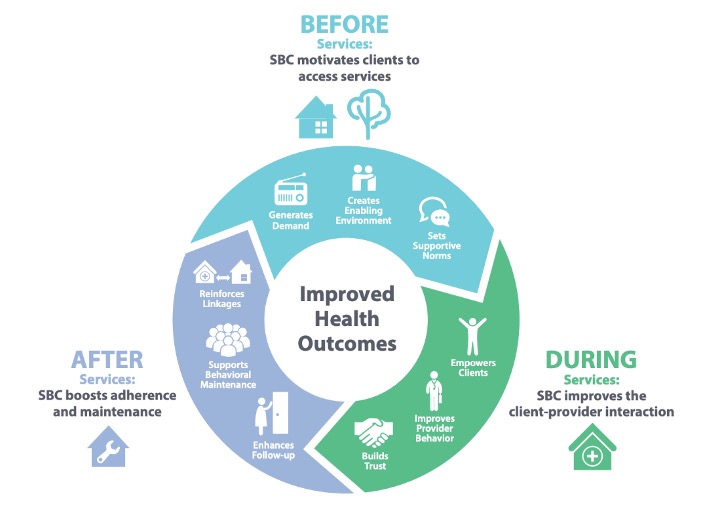
To complement this tool and further address gaps in SBC measurement, Breakthrough RESEARCH identified “Twelve Recommended SBC Indicators for Family Planning.” The graphic below includes a few examples of how these indicators can be applied to the Circle of Care to strengthen SBC measurement.
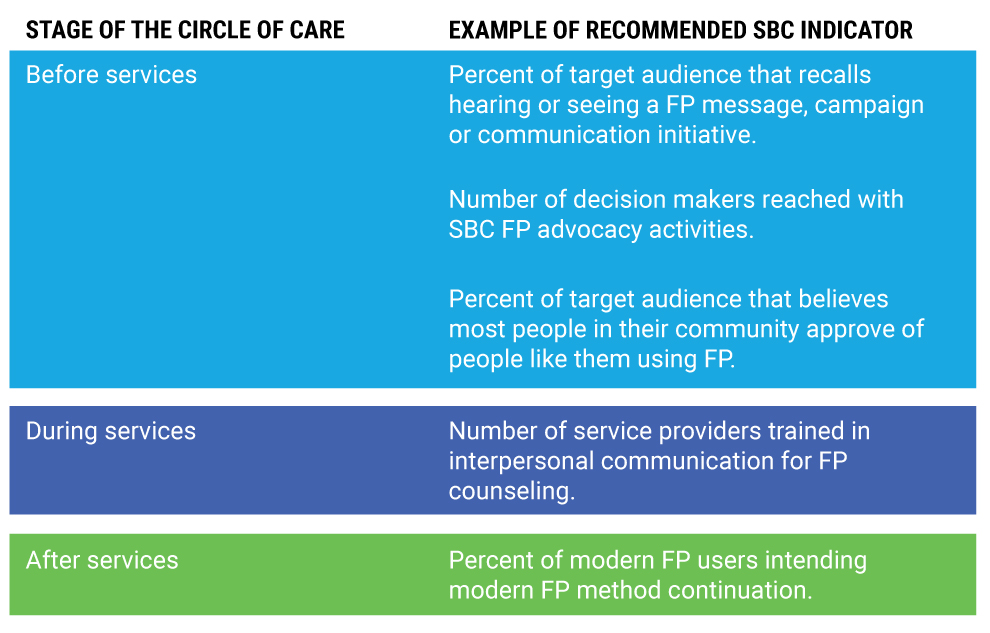
What Gets Measured Gets Done
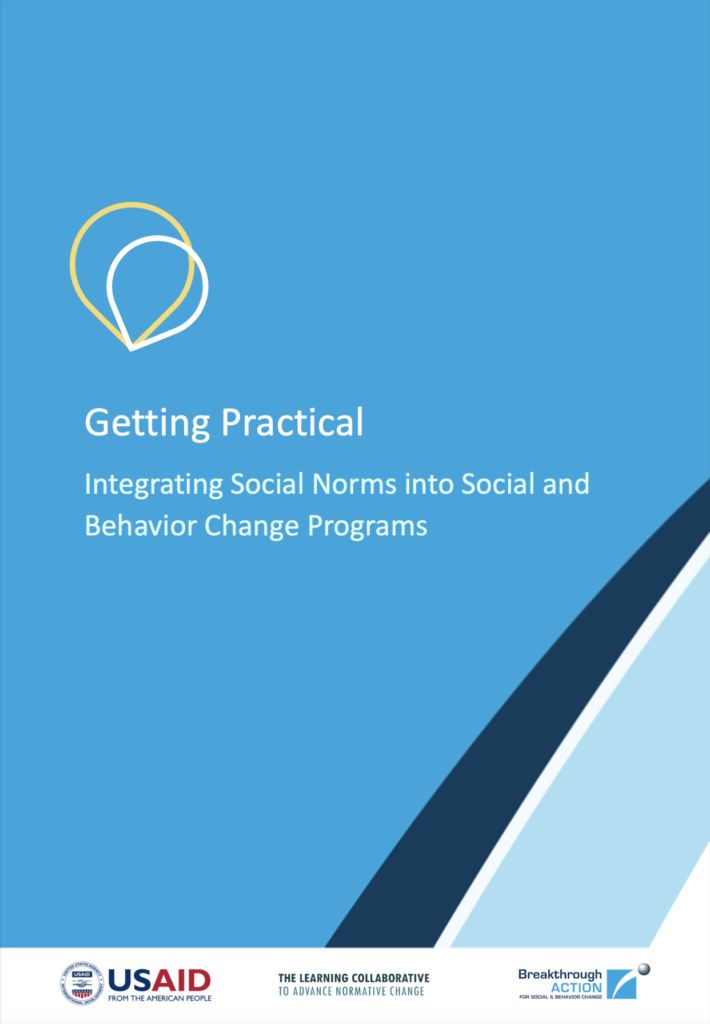 Supporting SBC as part of FP/RH programming and policies will not only help the Ouagadougou Partnership achieve its goal of doubling the number of contraceptive users but also contribute to the increased regular measurement of SBC-related indicators that supports SBC integration into FP service delivery programs. Following the OPAM2020 gathering in December 2020, Breakthrough contributed to the development and facilitation of a panel on social norms in March 2021. During this online session, the Breakthrough ACTION Getting Practical tool was presented alongside the Social Norms Exploration Tool (SNET).
Supporting SBC as part of FP/RH programming and policies will not only help the Ouagadougou Partnership achieve its goal of doubling the number of contraceptive users but also contribute to the increased regular measurement of SBC-related indicators that supports SBC integration into FP service delivery programs. Following the OPAM2020 gathering in December 2020, Breakthrough contributed to the development and facilitation of a panel on social norms in March 2021. During this online session, the Breakthrough ACTION Getting Practical tool was presented alongside the Social Norms Exploration Tool (SNET).
Governments, donors, and implementers should prioritize the inclusion of key recommended SBC-related indicators in their routine monitoring and support consistent integration of SBC measures at all levels. These data will be crucial to assess the extent to which the Ouagadougou Partnership countries are supporting women and men who wish to space or delay pregnancies.
For more information on Breakthrough RESEARCH’s indicator mapping activities, see:
- Is Better Measurement the Key to Increased Investment in Social and Behavior Change for Voluntary Family Planning in Francophone West Africa?
- Strengthening Social and Behavior Change Monitoring and Evaluation for Family Planning in Francophone West Africa.
For more on Breakthrough ACTION’s West Africa activities presented at the Ouagadougou Partnership’s Annual 2020 Meeting, see the four posters demonstrating the measured effects of:
- The Confiance Totale campaign.
- The Merci Mon Héros campaign.
- The Provider Behavior survey.
- The review of gender synchronization in Niger.
See also the new Breakthrough ACTION Getting Practical: Integrating Social Norms into SBC programs.
This blog post was originally published on the Knowledge SUCCESS website.

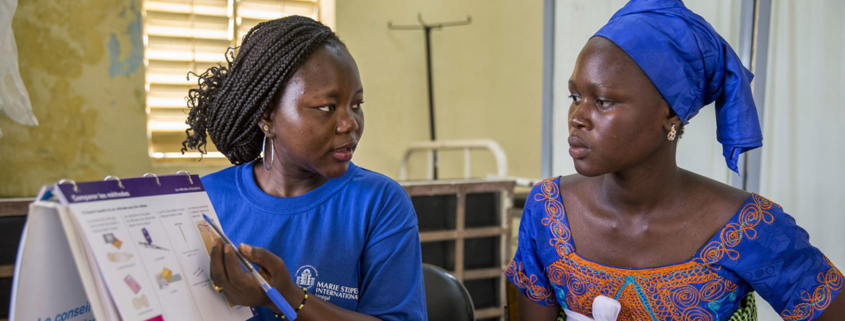 Jonathan Torgovnik/Getty Images/Images of Empowerment
Jonathan Torgovnik/Getty Images/Images of Empowerment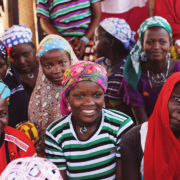 Cambey Mikush/Photoshare
Cambey Mikush/Photoshare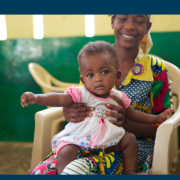 Sara Holbak/VectorWorks/Photoshare
Sara Holbak/VectorWorks/Photoshare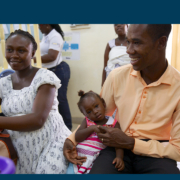 Sarah Hoibak/VectorWorks/Photoshare
Sarah Hoibak/VectorWorks/Photoshare Getty Images/Image of Empowerment
Getty Images/Image of Empowerment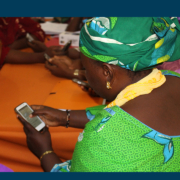 Shani Turke/Photoshare
Shani Turke/Photoshare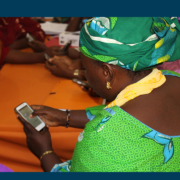 Shani Turke/Photoshare
Shani Turke/Photoshare